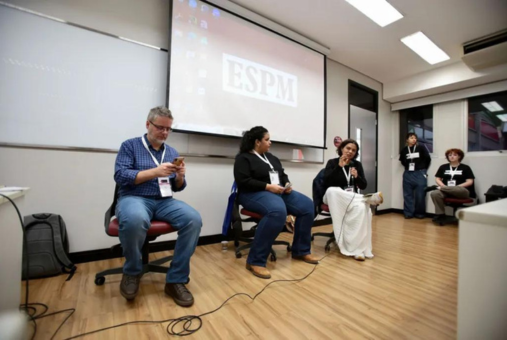Every journalistic story is the result of a series of choices — from the framing given to a reported fact to the sources heard, and even the words or images that shape the final content. In choosing what to include, the journalist also chooses what will be left out, what will not be told. What forces shape these choices and how do they relate to journalistic objectivity?
At the 18th International Congress of Investigative Journalism, held by the Brazilian Association of Investigative Journalism (Abraji, by its Portuguese acronym) in São Paulo between June 28 and July 2, professionals debated objectivity in view of the changes journalism has undergone in recent decades. Journalists Fabiana Moraes, professor at the Federal University of Pernambuco (UFPE) and columnist for The Intercept Brasil, and Ana Rita Cunha, audience director of the website Aos Fatos, participated in a conversation moderated by Marcelo Träsel, professor at the Federal University of Rio Grande do Sul (UFRGS), in the panel "Journalistic objectivity on the agenda."
The debate, held on June 30, dealt with how objectivity as a pillar of journalism has been contested and reworked in the face of demands for new perspectives and approaches in coverage. Especially regarding coverage by, about and for historically marginalized groups and the disinformation spread in online environments.

Marcelo Trasël, Ana Rita Cunha and Fabiana Moraes during the panel at the 18th Abraji Congress. (Photo: Pedro Moreira/Abraji)
"After all, what objectivity are we talking about?" asked Moraes at the beginning of the debate. "In general, I perceive a very binary perspective of the discussion about objectivity and subjectivity, almost as if one thing is the negation of the other," she said. In her most recent book, "A pauta é uma arma de combate [The agenda is a combat weapon]," Moraes poses precisely these questions about "subjectivity, reflective practice and positioning to overcome a journalism that dehumanizes," as the book's subtitle states.
"Objectivity is necessary to journalism — the fact-finding, the interviewing, the data checking," Moraes said, adding that all stories she has written to date have been the result of research and fact-finding. "But, obviously, we can't simplify that issue. Everything I chose, where I looked, what I brought to the texts also implied choices about what was left out. In other words: I made several choices, and none of them — neither mine nor yours — are innocent. Those choices invariably include class, race, gender, place of origin," she said.
"At the same time that I outline these objective choices, they are obviously based on subjective issues," Moraes said. This subjectivity is permeated by the social and collective context, and therefore cannot be reduced to the individuality of each professional.
"Xenophobia, racism, classism are not individual issues, but rather they are social and collective issues. And these issues guide my choices and guide the choices of editors, photographers, social media (...) Subjectivity is an individual issue and it is a collective issue. We can't forget that we are forged collectively," she said.
Träsel noted that this debate also connects to the problem of widespread disinformation that has taken hold in recent years. "Some of the production routines we have in newsrooms have become in a way 'hacked' by special interest groups," she said. She illustrated this with the use of the press by former Brazilian president Jair Bolsonaro to inflame his supporters against journalists and spread lies.
Cunha then brought the point of view of fact-checking agencies and the fight against disinformation into the discussion on journalistic objectivity.
"One thing that bothers me in this discussion is that [objectivity] is always treated as if it were only a reporter's thing. And [yet] we have an industry that has been suffering for a long time from a process of increasing precariousness that leaves reporters with less and less time, and fewer resources to work with. We may want to discuss objectivity, but the reporter works 12 hours, he has to go out and deliver a story at the end [of the day] (...) It only makes sense to discuss objectivity if you think about the collective practice of journalism," she said.
In the context of disinformation, the use of online tools for image editing and social media, exemplified Cunha, has made it possible for what used to give "a face of professionalism to journalism" to now be quite easily replicated by anyone.
"They [the disinformers] have 'hacked' a bit what we do. Only they do it in such a way that we can't do in journalism, which is without ethical commitment, and sometimes they manage to reach people. The only way to counteract this is to be better than those people. And the only way to be better than the disinformers is to do a more thorough, more serious job. And this is a collective commitment," Cunha said.
This commitment must include increasing diversity in the newsroom as well as an exercise in humility and active listening by journalists to their audience, she said. The decline in public confidence in the press, registered in recent years in surveys such as the one conducted annually by Reuters Institute, requires a change in journalistic practices, argued Cunha.
"We can no longer assume people trust us," she said. "It's a new exercise we're being forced to do. How are we going to get people to believe [in journalism] again? It's something we didn't have to do 10 years ago. It's not that everyone trusted it, but there was a much more accepting environment for the press, and that requires us to review some practices. Shouldn't we give more information, explain better the path we took, why we made certain choices? Not to take it for granted, as if people already understood the whole process, as if everything was obvious," Cunha said.